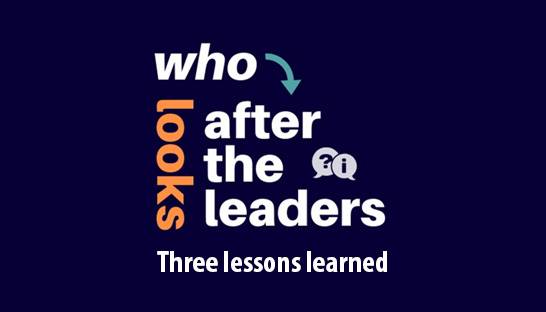[ad_1]
In June, State of Matter launched its own podcast series. In ‘Who Cares About Leaders?’ presenters interview inspirational leaders from across a range of Australian organizations and industries to find out how they managed their teams during the Covid-19 crisis.
Looking back on the first seven episodes, Leigh Parsons, managing director of the Victoria-based consultancy, reflects on three key takeaways so far:
The importance of self-awareness
One of the main themes that came up again and again was the importance of recognizing where you are and how you feel in the moment. Everyone has good days and bad days, but what sets great leaders apart is their ability to recognize their own energy level and adjust accordingly.
In the first weeks of the lockdown period, many leaders rushed to work remotely. But with Zoom calling for 8 hours a day, every day, everyone finds that they eventually hit a wall. Leaders should encourage their team to take regular breaks, get outside and go for walks whenever possible. The same goes for leaders, of course – you can’t take care of your team and your clients if you don’t take care of yourself.
Challenges of remote work
Everyone has adapted to working remotely differently, but one thing that stood out to the podcast participants is how a lack of social connection can hurt teams. Effie Gorringe touched on how she encourages her team to keep the camera and microphone off during meetings. It’s actually nice to see people’s homes, with family and pets wandering in and out.
At State of Matter, our leadership team has tried to really recognize each other’s energy levels and know when someone needs extra support. Like many other organisations, we’ve introduced things like virtual Friday night drinks to keep everyone connected. You can’t underestimate how important these social connections are to the well-being and productivity of everyone on the team.
Creativity and problem solving
A tremendous amount of creativity and entrepreneurship is required when dealing with a crisis. Leaders like Ian Wall at Worley are already well versed in building resilient teams and adapting to difficult situations around the world. At the end of the day, it’s about building teams you trust to make good decisions without you. Does your team feel empowered to speak up and act? Or are there roadblocks preventing quick decision-making?
Organizations like Worley that have most successfully adapted to the current situation are those that already had processes in place to deal with rapid change and upheaval.
Among the leaders who were interviewed for ‘Who Looks After The Leaders?’ were Deanna Lomas, director of integrated supply at NHP Electrical Engineering Products; Shaun O’Brien, National Risk Partner Manager at IAG; Sue Bingham, Executive Coach; Effie Gorringe, Chief Operating Officer, L’Oréal; Dirk Dobbs Strategy, Implementation and Change Executive at Hesta; and Ian Wall, director of global security and resilience at Worley.
[ad_2]


